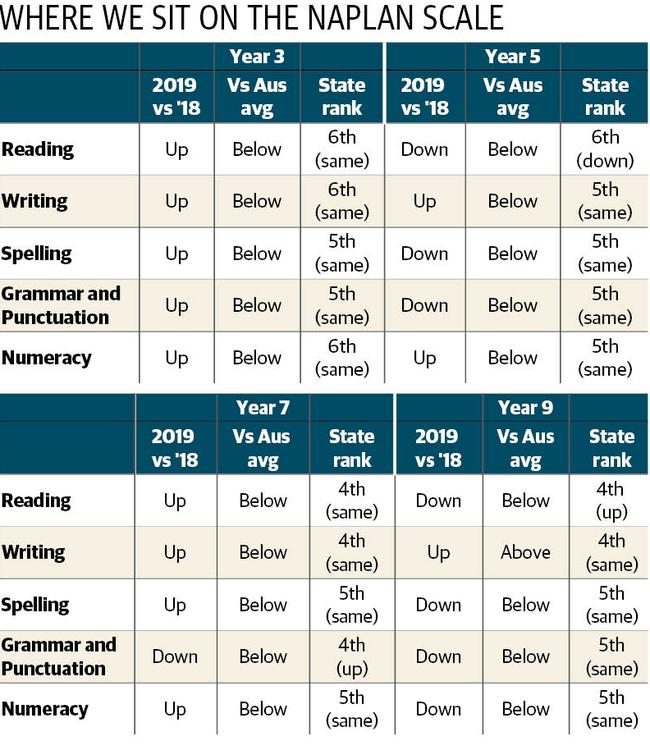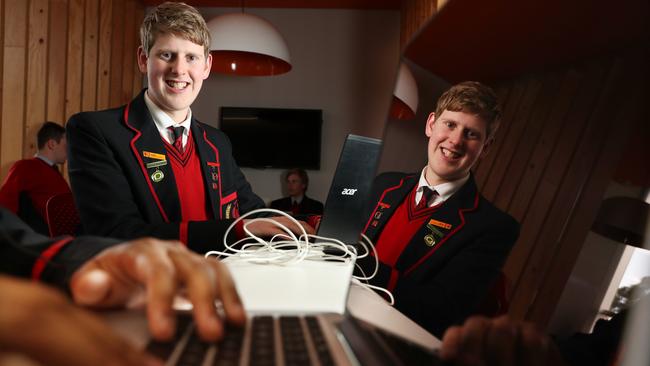SA improves in NAPLAN writing tests but still struggles overall against other states
SA students have scored above the national average in one school subject — but in 19 of the 20 tests our results left us lagging behind the rest of the country. See how each year level performed.
- Are kids getting smarter kids or is the work easier?
- Prizes, discounts, giveaways: What you get as a subscriber
South Australian students have significantly improved in NAPLAN narrative writing tests but the state has again recorded overall results that lag behind the rest of the country.
SA scored above the Australian average in Year 9 writing – a first for any category in any year level since 2016 – and also made significant gains in writing in Years 3 and 5.
However, the uplift in writing was a national trend.

SA stayed below national averages in 19 of 20 tests across the four participating year levels, and was the worst-performing mainland state in 15.
Apart from generally leading Tasmania, SA managed to best Queensland in four of the 20 tests and WA in one.
But in two of the cases where SA improved its ranking to finish fourth among the states – Year 7 grammar and punctuation and Year 9 reading – its raw scores declined.
The state’s Year 3 scores rose in every test – reading, writing, spelling, grammar and punctuation, and numeracy – yet it remained our weakest year level against other states.
Year 9 results were down in everything except writing.
Year 7 scores were mostly up while Year 5 ones were mixed.
In most cases, the differences from last year were not large enough to be statistically significant.
READ MORE
Which South Australian public schools are NAPLAN high achievers?
SPECIAL SECTION: Data breakdown into school demand, funding and monitoring
As well as the writing gain, and more Year 3s in high-achieving bands for reading, the State Government pointed to SA’s Years 3 and 5 numeracy results as the state’s highest in those categories since NAPLAN began in 2008.
“We are giving schools the support they need to deliver better literacy outcomes for students and while we readily acknowledge there is still a long way to go, the early signs are positive,” acting Education Minister Rob Lucas said.
He said the Government’s policies aimed at lifting results included literacy coaches, phonics screening checks, teacher professional development, expanded school breakfast programs and free dyslexia workshops for parents.
The Opposition said Education Minister John Gardner, who is on leave, had criticised similar results in previous years as “distressing” and “hardly conceivable”, and the Government was “hunting for any good news” while “downplaying the many drops”.
“On top of diverting resources to prop up the Year 7 move (into high schools), the Government is cutting $50 million out of the (Education) Department over the next four years, which can only hurt schools’ efforts to improve literacy and numeracy outcomes,” Labor’s education spokeswoman Susan Close said.
Federal Education Minister Dan Tehan said the Morrison Government was improving the Australian Curriculum so teachers could meet each student’s needs, and “creating a unique student identifier so that students can be supported no matter where they move”.
The Australian Curriculum, Assessment and Reporting Authority said the national gains in writing were pleasing “given the decline in recent years across all year levels”.
It insisted all results were comparable, despite technical glitches forcing 50,000 students to resit online tests. But the Australian Education Union said this year’s data was “so seriously compromised”, it should not be relied upon”.
‘Old-school’ student ready for new exams
Jack Myers is an “old-school” student who prefers handwritten notes over computer files, yet he’s chosen all three Year 12 subjects with electronic exams this year.
The Rostrevor College student will be among 5600 SA students who will take at least one computerised SACE exam in English literary studies, modern history or psychology.
Last year’s electronic English literacy exam – sat by 2070 students from 115 schools – was an Australian first for a Year 12 end-of-year exam.
Jack says he generally prefers handwriting because he doesn’t want “to risk losing everything with technology”.

But he’s “comfortable” with the electronic format after doing trial exams made available by the SACE Board for a “practice window” this month.
“Teachers are using (computer)-based tests to get students used to typing and going back to find spelling mistakes and stuff,” he says.
Beyond school, the 18-year-old is banking on the reliability of computers for his career.
He wants to study mathematical and computational sciences at Adelaide University and become a data analyst for a major sporting club.
“Obviously, there’s a lot of jobs in data nowadays,” he says. Jack will get the chance to do a traditional pen and paper exam in chemistry.
A SACE Board spokesman says the trial exam period also “gives schools the option to assess their technical readiness and exam-day preparedness”.
